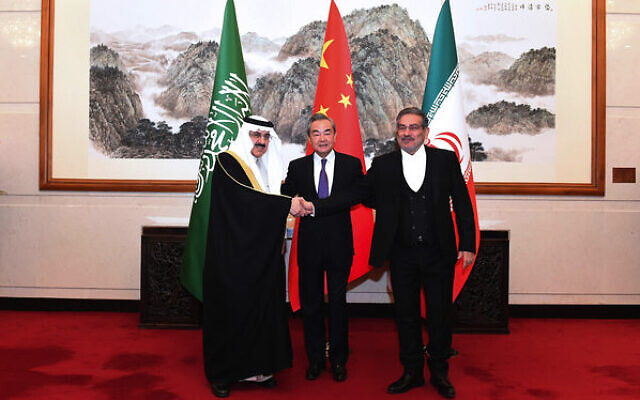Iran, Saudi Arabia re-establish relations
'There was a feeling of American and Israeli weakness, so Saudi Arabia turned to other channels'

A senior official travelling with Israeli Prime Minister Benjamin Netanyahu’s entourage in Rome last Friday sought to blame the deal reached by Saudi Arabia and Iran to re-establish diplomatic relations on the previous Israeli government and the Biden administration’s combined weakness.
The two countries announced their rapprochement last Friday after years of acrimony.
“There was a feeling of American and Israeli weakness, so Saudi Arabia turned to other channels,” the senior official told reporters.
The official claimed that the talks between Riyadh and Tehran began during the tenure of Naftali Bennett and Yair Lapid’s short-lived unity government when US President Joe Biden’s administration was more committed to re-entering the Iran nuclear deal. As a result, Saudi Arabia turned to China, which served as a counterweight to the US and helped broker the agreement announced on Friday.
However, while the Bennett-Lapid government was formed in June 2021, the negotiations between Riyadh and Tehran in fact began in April of that year, when Netanyahu was still prime minister.
Earlier on Friday, Bennett and Lapid blamed Netanyahu for the Saudi Arabia-Iran rapprochement, arguing that it was the result of diplomatic neglect, general weakness and internal conflict in the country since the current government was established on December 29.
The remarks represented a clear shot by the Prime Minister’s Office at Biden, who entered office pledging to re-enter the Iran nuclear deal but has gradually moved away from that effort over the past year amid Tehran’s military cooperation with Russia and the ongoing protests in the Islamic Republic against the regime there.
Dismissing claims that the current government was responsible, the senior official claimed members of the previous government should ask themselves why the initial contacts began during their tenure — despite the latter claim being false.
Lapid — now opposition chairman — scoffed at the Netanyahu government’s accusations, tweeting that his government put every other issue aside when it became clear to them that the Biden administration was on the verge of re-entering the Iran nuclear deal. “We worked on it 24/7,” Lapid said, suggesting that Israel played a role in blocking the deal.
He contrasted that with the current government’s tenure, during which Iran has succeeded in enriching uranium to 84 per cent purity.
“And this right-wing government? [It is focused] not on Iran, not on the terror attacks, not on the economy, not the cost of living. All they care about is destroying democracy and tearing the people apart,” Lapid said.
Meanwhile also on Friday, Iran National Security Council secretary Ali Shamkhani told Iran’s Nour News that the agreement with Saudi Arabia “will definitely be a serious obstacle to the presence and interference of extra-regional countries and the Zionist regime in the region.”
The deal also appeared to mark a blow to Israeli efforts to normalise relations with Saudi Arabia.
However, the senior Israeli official briefing reporters insisted that the Friday agreement would not harm Netanyahu’s endeavour.
“What happens on the diplomatic level is not what happens under the surface,” the official said, hinting at ongoing efforts between Israel and Saudi Arabia taking place behind the scenes.
Regional observers cautioned that the actual implications of the deal are far from clear – both in terms of future Saudi-Iran cooperation and Israel’s relationship with Riyadh.
The notion that Saudi Arabia was exclusively interested in Israel as part of a potential front against Iran was always “superficial,” said Saudi analyst Aziz Alghashian.
“This idea of ‘the enemy of my enemy is my friend’ — Saudi has seldom operated in that way, especially not strategically,” he said.
But “this doesn’t mean very quiet relations with Israel are going to cease… Now the relationship with Iran is a variable that is part of the calculation.”
Nicholas Heras, of the New Lines Institute of Strategy and Policy, called the deal “a clear diplomatic victory for Iran” and “a blow” to Netanyahu.
TIMES OF ISRAEL, AFP

comments